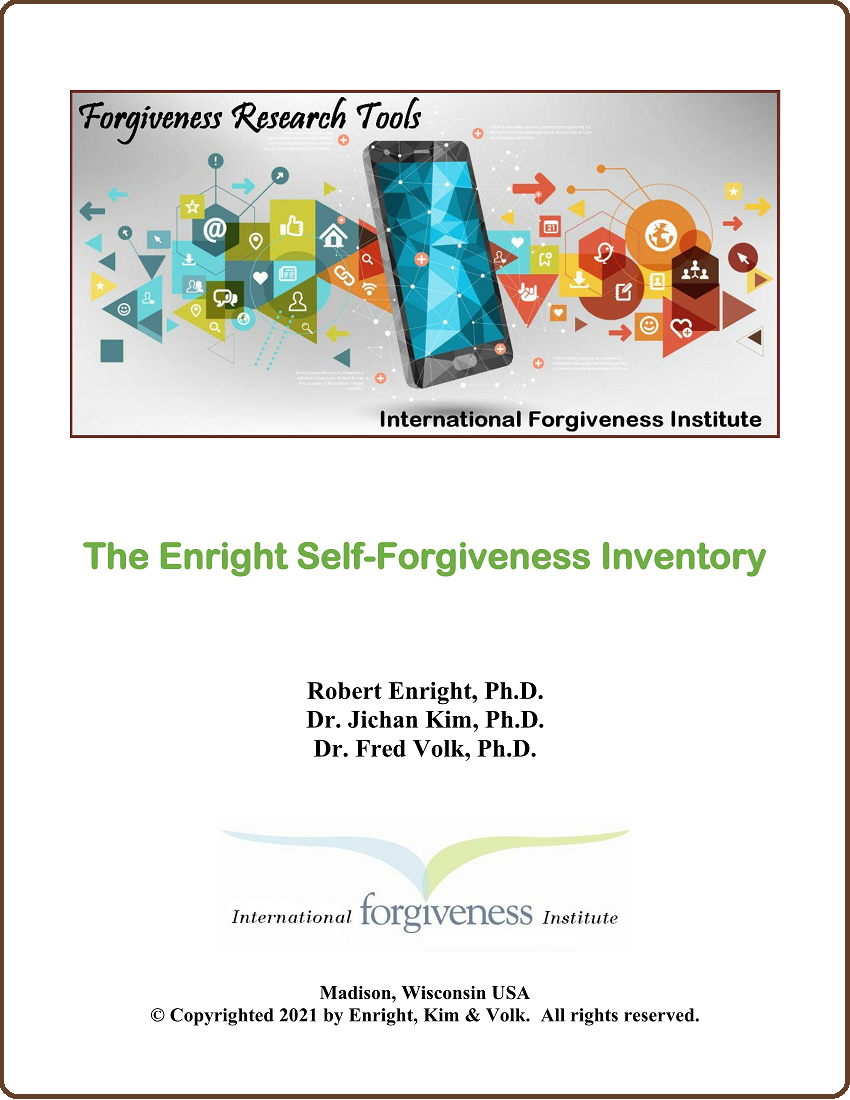Tagged: “Counseling”
Do you think people get less out of forgiving if the motive is self-preservation rather than a concern for the other as a person?
We have yet to do a research study in which we examine different outcomes for those who have different initial motives for forgiving. One problem in doing such a research study is this: Often people start Forgiveness Therapy because of their own emotional compromise caused by an injustice from others. Yet, as people go through the forgiveness process, their motive often changes from a focus on the self to a genuine concern for the other. Thus, this issue of motive is a moving target and so is difficult to study. Yet, it is worth more careful thought.
Is there an exposure therapy for those who are scared to forgive? For example, if someone is afraid of elevators, the key is to spend some time near elevators, then to enter one that is not moving, and then eventually to go up one floor in an elevator. Is there something such as this for fear of forgiving?
We do not start Forgiveness Therapy for those who are apprehensive toward forgiving. Instead, the key here is to spend time discussing as clearly as possible what forgiving is and what it is not. In the vast majority of cases, those who fear forgiveness have an incorrect definition of what it is, for example, presuming that one must put up with abuse (which forgiveness definitely is not).
In your book, “Forgiveness Is a Choice,” you start with a case study of Mary Ann. Would it have been easier for her just to divorce her husband, given that he was toxic, rather than forgiving and reconciling?
Because forgiveness is a choice, we have to be careful not to judge others for their particular decision. In Mary Ann’s case, there was a genuine reconciliation. Since reconciliation involves mutual trust, we can surmise that he made important changes. Mary Ann is happy now and so her decision to forgive and reconcile was wise.
Forgiveness and Finding Meaning in Sacrifice
〈This is an excerpt from my book, 8 Keys to Forgiveness, W. W. Norton & Company, 2015.〉
When you sacrifice for others, you are doing a lot more than acting in service to them. They may be bleeding emotionally inside, and you then bleed inside to help them stop bleeding inside. For example, Brian’s mother, Yolanda, was overly-controlling toward him and his partner, Simone. Instead of distancing himself from Yolanda, he spent time gently giving her examples of her not letting him, in her own mind, develop independence in adulthood. This took energy, a checking of his anger so it did not spill out to her, and some suffering on his part to help her to understand.
Of course, we have to exercise temperance here too. Sacrifice does not mean that you do damage to yourself. The paradox is that as you sacrifice for others, you experience emotional healing.
Dr. Frankl, in his book, Man’s Search for Meaning, provides a remarkable case study of the kind of meaning one can find in sacrificing for others. His example is not in the context of forgiveness. I relate it to you so that you can see how sacrifice works and becomes an aid to the one who is doing the sacrificing. An elderly physician came to see Dr. Frankl because of the loss of his wife 2 years earlier. Dr. Frankl saw that he was psychologically depressed. His question to the physician was this: “What would have happened to your wife if you were the one to go first?” With that question a bigger picture opened for the physician. Had he gone first, then it would have been his beloved wife who would be visiting Dr. Frankl for her depression. By her going first, she was spared years of grief. The physician then understood that he could willingly take on the suffering on behalf of his wife……….
Can you see how a sacrificial attitude, within reason, could aid you in forgiving and in overcoming resentment? I say within reason because you do not want to overdo this either. If a person refuses to hear what you have to say, or refuses to accept your sacrificial gestures and begins to use you, then it is time to reexamine the approach. None of these approaches is foolproof. If you see  benefit in the sacrificial attitude and related behaviors, then what is your particular plan? What will you do that is hard for you to do in service to the other? How long will you give this undertaking? Do you see even a glimmer of evidence……that the other is open to even small change? Be sure to monitor your coping level during this exercise so that the sacrifice does not lead to an even greater resentment. If that begins to happen over a period of time, then it is time to reevaluate this particular approach in your case. If, on the other hand, it seems to be working, then stay at it as long as you can and as long as the other is willing to work with you in changing behaviors.
benefit in the sacrificial attitude and related behaviors, then what is your particular plan? What will you do that is hard for you to do in service to the other? How long will you give this undertaking? Do you see even a glimmer of evidence……that the other is open to even small change? Be sure to monitor your coping level during this exercise so that the sacrifice does not lead to an even greater resentment. If that begins to happen over a period of time, then it is time to reevaluate this particular approach in your case. If, on the other hand, it seems to be working, then stay at it as long as you can and as long as the other is willing to work with you in changing behaviors.
Reflect on the possibility that without your forgiveness, that person may never learn to live well. You may be playing a part in helping him or her grow deeply as a person. How might that be? He or she is being given a chance to see what genuine love is and to see it in action. Your sacrificial approach may even be playing a part in the very survival of this person. Of course, you do not want to go so far with this sacrifice that you do damage to yourself. Instead, the point here is that as you give of yourself, within reason, this giving might prove to be emotionally healing for you. When you are ready, write down your answer to the question of how you may be aiding the other’s healing.
Dr. Frankl then gives the reader an insight that is worth remembering: Sacrifice changes as soon as it is linked to a sound meaning that underlies it. The physician now had a meaning for going on, and his willing acceptance of outliving his wife was a sign that he loved her and wanted her safe.
Robert
Forgiveness Research Tools Flying Out the Door and Around the World
When The Christian Science Monitor called him “the father of forgiveness research” nearly 20 years ago (Dec. 19, 2002), Dr. Robert Enright, a University of Wisconsin-Madison educational psychology professor, had just completed what the news organization called “the first study ever to show a cause-and-effect finding regarding physical health. . . and forgiveness.”
Today, as Dr. Enright nudges close to 37 years of forgiveness study and interventions, his research tools and techniques have become the preferred instruments of social scientists and researchers around the world. To stimulate even further growth in the burgeoning field, the forgiveness pioneer is giving his research tools away at no cost and with no strings attached.
On April 20 of this year, Dr. Enright announced that the non-profit educational organization he founded–the International Forgiveness Institute (IFI)–would provide his highly regarded scientific research tools absolutely free to any forgiveness researcher who requested them. In just the four months since then, the IFI has received and fulfilled orders for 252 copies of his individual tool documents from researchers in 21 foreign countries and 27 US states.
The free research tools available from the IFI and the number of copies distributed since April include:
- The Enright Self-Forgiveness Inventory (ESFI) – 76 Requests
This measure is based on the conceptualization of forgiveness as a moral virtue. The ESFI is a 30-item scale featuring six subscales with five items each. Five additional items at the end of the scale allow for measurement of Pseudo Self-Forgiveness (PSF). Although several competing self-forgiveness measures exist, Dr. Enright’s is the only one that captures the idea that self-forgiveness is a moral virtue that includes behavior toward the self.
- The Enright Forgiveness Inventory-30 (EFI-30) – 85 Requests
This tool is a shorter version of the Enright Forgiveness Inventory for Adults that has become the interpersonal forgiveness measure of choice for research professionals in the U.S. and abroad since its development in 1995. The EFI-30 reduces the number of items from 60 to 30 for the purpose of a more practical assessment of this construct. Data from the United States were used in the creation of the new measure and applied to seven nations: Austria, Brazil, Israel, Korea, Norway, Pakistan, and Taiwan to develop its psychometric validation.
- The Enright Group Forgiveness Inventory (EGFI) – 44 Requests
The EGFI has 56 items across seven subscales with each subscale having eight items. Those subscales measure a group’s motivation and values regarding forgiveness, peace, and friendliness toward the other group. The instrument is a valuable tool that could enhance peace efforts in the world. The EGFI was validated and published earlier this year by Dr. Enright and a team of 16 international researchers who collected data from 595 study participants in three different geographic and cultural settings of the world—China and Taiwan, Slovenia, and the US.
- The Enright Forgiveness Inventory for Children (EFI-C) – 47 Requests
The EFI-C is an objective measure of the degree to which a child forgives another who has hurt him or her deeply and unfairly. It is a 30-item scale similar to the 60-item adult version and is presented orally to very young children and in writing to those who can read well. Thanks to a researcher in Pakistan, the EFI-C is now available in the Urdu language—the native language of an estimated 230 million people, primarily in South Asia.
“Making these tools available to researchers at no cost is one way to grow the repository of forgiveness knowledge,” Dr. Enright explained. “This area of moral development has produced significant advancements in the areas of education, medical treatment, and therapy, so why not encourage others to help expand that information base?”
“There’s no getting around it – forgiveness is good for you and holding a grudge is not.”
-The Christian Science Monitor
- Learn more and order Dr. Enright’s free tools on the Forgiveness Research Tools page.
- Read how the EFI-30 was tested and validated in 8 countries around the world.
- Read the entire forgiveness article in The Christian Science Monitor.



